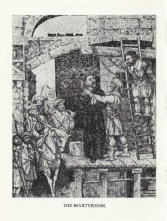
© Lorem ipsum dolor sit Nulla in mollit pariatur in, est ut dolor eu eiusmod lorem 2013
Father Ogilvie was finally put on trial for treason on March 10, 1615, at the Tolbooth in Glasgow’s
Square. Facing the charges, he declared that he would “die in defence of the King’s civil authority, but
he could not obey him on spiritual matters”.
Two hours after the trial began, the jury found him guilty, and he was condemned to be hanged and
quartered that afternoon. Father Ogilvie spent three hours in prayer while the judges and jury went to
lunch. Then, at 4pm, the sheriff came to escort him from the Trongate to the public square for
execution. Holding the rosary, the Jesuit mounted the scaffold and prayed briefly.
A last-minute reprieve of his life and the promise of a substantial sum of money were refused. He
declared his loyalty to the King, and made it clear he was dying "for religion alone", adding: "For that, I
am prepared to give even a hundred lives." Father Ogilvie threw his rosary into the crowd. It struck a
Hungarian merchant visiting the city, and became the instrument of his conversion. The hangman tied
the priest’s hands, led him up the ladder and pushed him off. He did not die immediately, so the
executioner grabbed his legs and pulled him down to end his agony.
The crowd murmured against the injustice of the execution, and instead of the body being quartered, it
was spirited away to be buried secretly in a criminal’s plot on the outskirts of Glasgow.
St John Ogilvie
Trial



© Lorem ipsum dolor sit Nulla in mollit pariatur in, est ut dolor
eu eiusmod lorem 2013
Trial
St John Ogilvie
Father Ogilvie was finally put on trial for treason on
March 10, 1615, at the Tolbooth in Glasgow’s Square.
Facing the charges, he declared that he would “die in
defence of the King’s civil authority, but he could not
obey him on spiritual matters”.
Two hours after the trial began, the jury found him
guilty, and he was condemned to be hanged and
quartered that afternoon. Father Ogilvie spent three
hours in prayer while the judges and jury went to lunch.
Then, at 4pm, the sheriff came to escort him from the
Trongate to the public square for execution. Holding
the rosary, the Jesuit mounted the scaffold and prayed
briefly.
A last-minute reprieve of his life and the promise of a
substantial sum of money were refused. He declared his
loyalty to the King, and made it clear he was dying "for
religion alone", adding: "For that, I am prepared to give
even a hundred lives." Father Ogilvie threw his rosary
into the crowd. It struck a Hungarian merchant visiting
the city, and became the instrument of his conversion.
The hangman tied the priest’s hands, led him up the
ladder and pushed him off. He did not die immediately,
so the executioner grabbed his legs and pulled him
down to end his agony.
The crowd murmured against the injustice of the
execution, and instead of the body being quartered, it
was spirited away to be buried secretly in a criminal’s
plot on the outskirts of Glasgow.






















